Q&A: Author's Hard Edged Story About Girlhood on the Family Schooner
'Coming of Age in Troubled Waters'
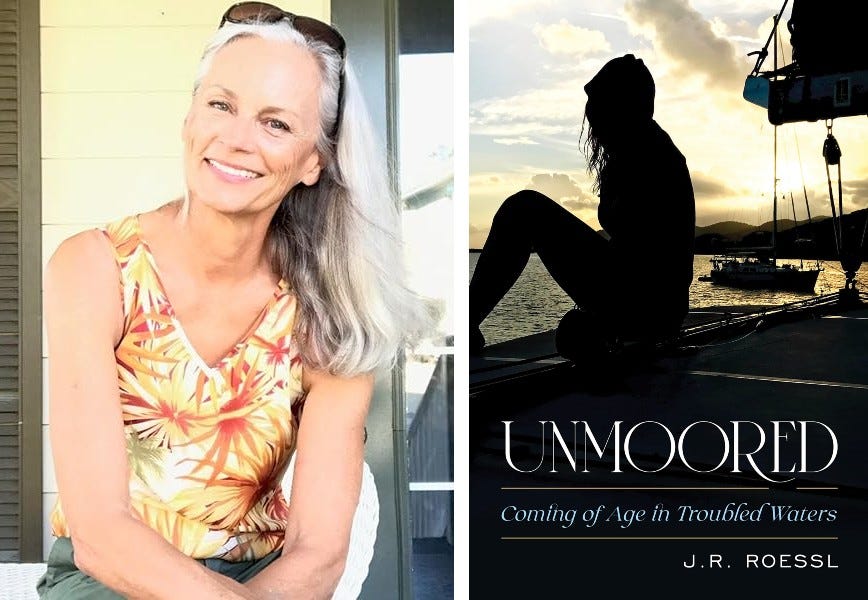
Loose Cannon: My late mother would be proud of me. It took six decades, but I have finally got around to reading a girl's coming-of-age story, and I actually liked it, maybe because it featured a boat. She always wanted me to read "Heidi," which she had loved growing up, about a shepherd girl, I think.
Maybe your story is what happens when "Heidi" meets "Mutiny on the Bounty." Why did you write "Unmoored?"
J.R. Roessl: Good question! And I love the Heidi meets Mutiny on the Bounty description. Great comparison for a movie pitch. Hey, Hollywood, are you listening?
There were actually two reasons why I sat down after fifty years to write this story. The first was, as long as I can remember, that I’ve been a storyteller. So, during my career years traveling the world, I’d regale and entertain clients with stories of my family battling it out on our boat on the high seas. The response was always an enthusiastic, “You should write a book!" or “That would make a great movie!”
But it’s one thing to tell a story and another thing to sit down and write it.
For years, I had a busy career that kept me traveling around the world. When I stopped traveling, I focused on completing my degree. By the time I graduated at age forty, most of my friends were becoming empty nesters, while I was experiencing a new marriage and would, in the ensuing years, start a family.
It wasn’t until my daughter was a teen, however, that I realized I’d gained enough insight and perspective as a parent to write this book. For years, I knew I wanted to write a story where the reader would experience the voyage in real time. To accomplish that I chose to write in first person, present tense. But in order to do that, I had to peel back the years to return to my teenage self.
With age comes, hopefully, wisdom, and as I mentioned above, insight and perspective. I knew enough time had to pass before I could write objectively and without judgment. Once I was able to do that, I knew I could write the story through the lens of my younger self.
I dedicated the book to my daughter, and while her major takeaway was, “Mom, you smoked weed!” I am happy to say that her friends think I’m way cooler than their (younger) moms.
L.C.: From my reading the three oldest were miserable much or even most of the time. Was that the case, and should the takeaway be that teenage years are not the right time to take the family cruising?
J.R.: There were moments when, away from the captain, my sisters and I were able to be like any other teens who are happy to rid themselves of parental oversight. We escaped in the dinghy, spent watches together, swam in the ocean, or hiked into town. But having to coexist in an extremely small and confined space for weeks at a time, and at the mercy of the sea and weather, created the perfect dynamic for dysfunction and personality clashes, especially with a father/captain who was not the calmest under duress.
While I would not trade those experiences I had as a teen (as it shaped who I am today), there are many families who now sail with young children. On their YouTube channels, we see these young parents smiling and filming their toddlers racing along the decks and swinging from the halyards. Maybe their confidence comes from having all the conveniences and safety of the latest nautical technology. In the late sixties and early seventies, however, there was no GPS, survival gear or satellite beacons to help rescue you.
It was man versus nature. And for my father, he needed us to be at an age to help crew. If we had been younger I don’t think we would have sailed very far. If we had been older than what we were, we might have abandoned ship! So, I would say for some, there is no right time, and for others, sailing with kids at any age is welcomed and enthusiastically embraced.
L.C.: As someone who has cruised in the tropics on a real tight budget, I can only start to imagine trying it with a big family to take care of. This had to be a big stressor. Do you think that if your finances would have been healthier, maybe that would have given your dad the peace of mind to have behaved better and the financial cushion to, say, stay at marina longer to avoid making iffy passages?
J.R.: Finances are always a big stressor, so yes, if we hadn’t lost money in the stock market or my parents had kept their savings in a regular bank instead of a savings and loan, that might have made a difference. Also, having my grandfather handle the finances was not a good idea as he held the purse strings.
L.C.: Do you think that them not having to worry about money was part of what made some of the other cruisers you met along the way so much fun to be with?
J.R.: In some cases, yes, like the Frasers. But they were as dysfunctional as we were, but could live their dysfunction in style. Many of the other cruisers consisted of young guys who were itching to see the world and so long as they had a beer or blunt in their hand, were happy with their life. Whenever they ran out of money, they’d stop and work on other boats or find whatever work was available. Even the Pardeys did that. When we met them for the first time in Costa Rica, Larry was helping build a fishing trawler. None of these individuals, with the exception of the Fraser’s who had a daughter, had families to worry about.
L.C.: Your portrayal of yourself is one of a pretty tough kid. At times, you display physical courage. No one else in your family seems to have that. Where did it come from?
J.R.: I guess you could say that I was wired differently, both physically and mentally. I was a natural athlete from an early age as opposed to my older and younger sisters, who were not. This natural athleticism gave me an edge on board, and the confidence that I could handle physical tasks that even my father was fearful of performing. Growing up a tomboy with a preference to play “combat,” a version of the modern sport of “parkour,” with all the neighborhood boys, bred a feeling of fearlessness in me.
If I could scramble up a tree and then take a flying leap off of it and survive with just a few scrapes, leaping to the dock with a bowline or climbing the ratlines to the spreaders to fix a block was a no brainer.
As far as emotional or mental courage, I give my maternal grandmother all the credit. Under the safety net of her unconditional love and strong moral compass, I found my own internal strength. When life seemed unbearable, I reminded myself of what my grandmother endured. Her Cinderella story of living under the roof of her widower father and an evil stepmother, made a lasting impression.
Sent away at thirteen to work in a factory in Hamburg while her step-sister was allowed to enjoy the comforts at home, my grandmother toiled until she was able to escape and book a passage to America at twenty-one. Most important, she found the humor in everything and taught me that courage is simply the result of standing up for what you believe to be right and true.
L.C.: You live in Vermont now, I think. When was the last time you slept overnight on a boat?
J.R.: A little farther south, in Pittsburgh, Pa.! I think the last time I slept overnight on a boat was in 1987, when I was dating the actor, William Hurt, who, inspired by my family’s trip, had a Crealock 37 (Pacific Seacraft) built for him. Since then, I have day-sailed in the Caribbean, Cabo San Lucas, and recently in the Bay Area.
L.C.: Pittsburgh! Ooops. Sorry. I got you confused with another writer that I barely know. Obviously, you could not have been too scarred if you were inspiring others to buy something as hands-on as a sailboat.
You went on to work as a model and actor. Is it possible that something from your time on Heritage helped inform your career as opposed to being a distraction?
J.R.: I would say my time spent onboard Heritage proved to be a seminal experience that shaped who I am today. It definitely gave me the strength and resilience to weather the rejection and hardships that anyone pursuing the arts encounters. Also, even though the voyage was my father’s dream, it taught me to pursue my own. And traveling and spending time in other countries gave me a life-long desire to see and experience more of the world. Modeling definitely afforded that.
As far as acting, which included for a time a stint performing improve, it was a way to tell stories, albeit other people’s. Writing, however, gave me the ultimate satisfaction, where I could reach people by telling my own stories.
L.C.: So, what's next? Another memoir?
J.R.: I’m workshopping my next book (a memoir) on Medium, which has allowed the luxury of receiving immediate feedback from readers. When you sit down and write a book, which may take a couple of years, you have no idea until it is published whether anyone will want to read it. That’s why I like Medium and Substack, because you can put your work out for anyone to read and get a quick reaction or response. I also have some nonfiction projects (parenting teen books) that I will be self-publishing early this summer. But I keep that separate from my literary endeavors and write under a pen name.
I had planned on writing a trilogy: The first, “Unmoored,” which covered my teen years; the second, highlighting my career years traveling the world; the third focusing on my current life. But Substack and Medium offer the opportunity to write about my current life, so this next book will be my last memoir. Maybe for my third book, I’ll try my hand at fiction. Possibly a thriller set on the high seas!
L.C.: Great! Thanks for sharing the story behind the book, and good luck on your future endeavors. Now that you know what kind of stuff we publish, feel free to pitch a story our way. The pay sucks, but we’ve got a great audience.





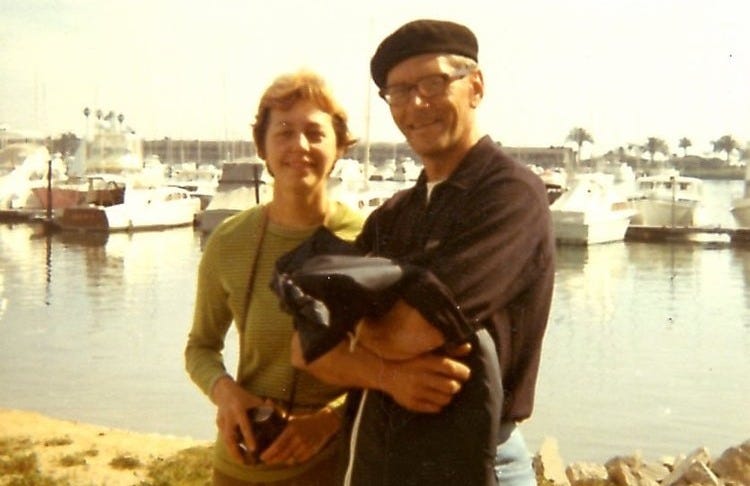

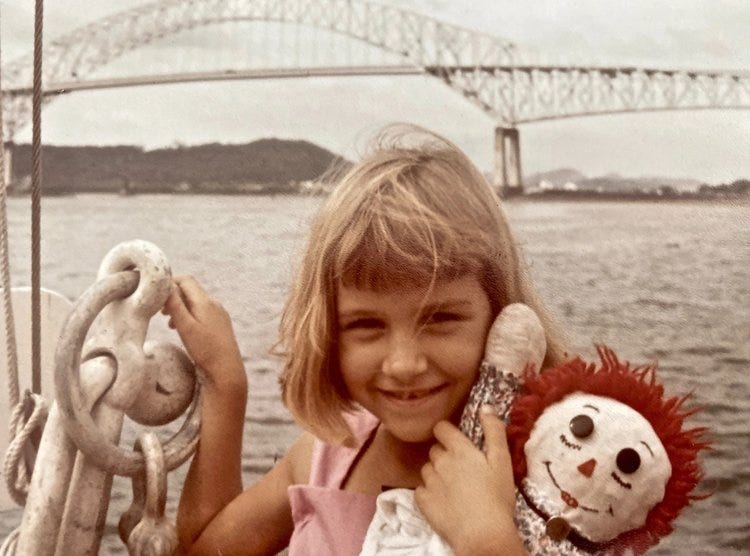
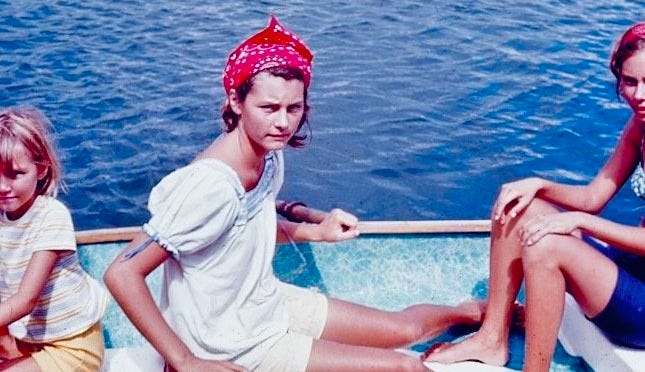
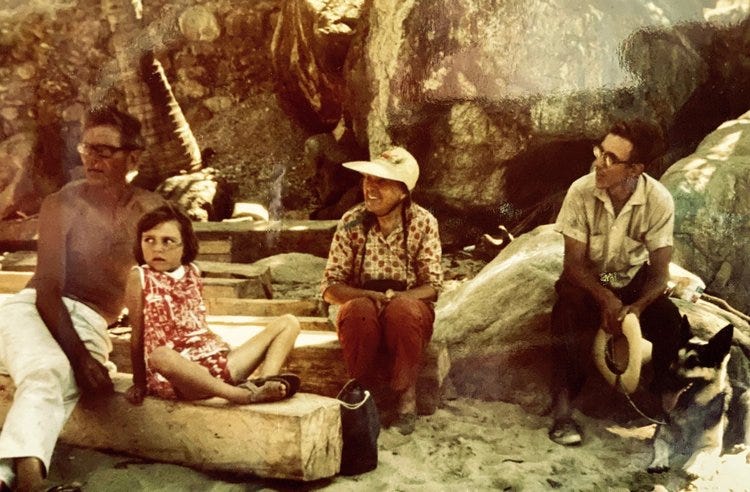

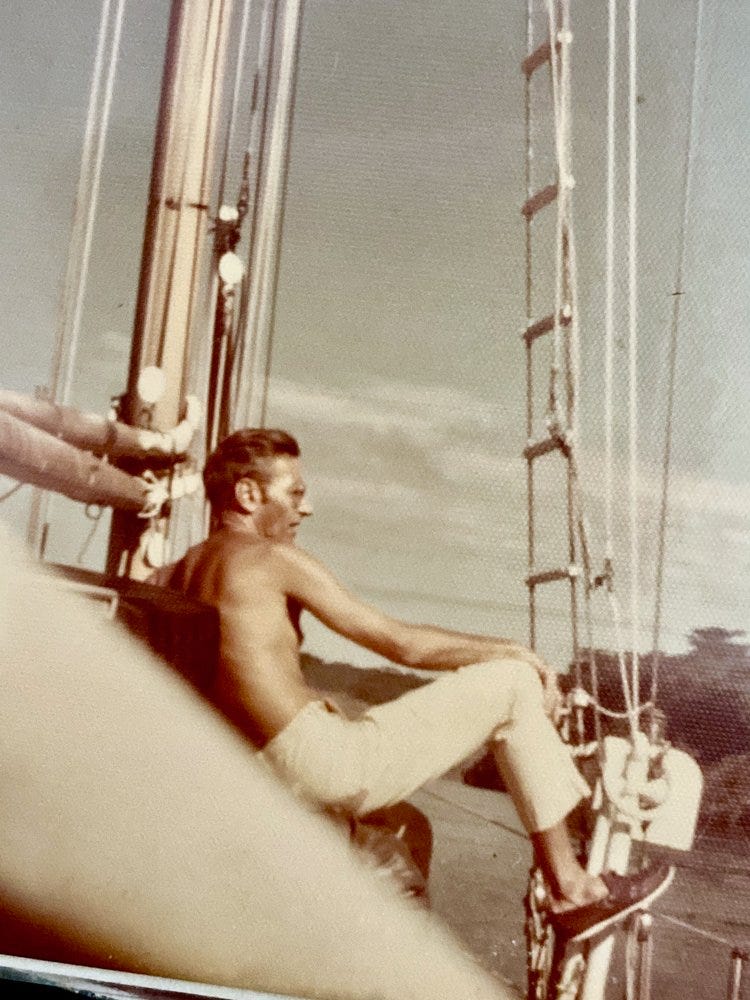
This story has been out for quite a while now. While I have not read the book, I will point out that at least some of what the author is complaining about here applies, at some level, to *all* children. Children do not have a say in the conditions under which their family lives. Children raised in factory towns, or military bases, or religious compounds, or remote scientific outposts could all say the same thing: my childhood deviated from "normal" (whatever that is) because of where I was raised and/or career or lifestyle choices made by my parents, and looking back I'm not happy about it and I was deprived of *something*. Sometimes it's circumstance and not choice -- children raised in abject poverty might have a grievance that can not be squarely laid at the feet of their parents. And on the flip side of this, children raised in statistically "normal" places in very conventional ways might have the opposite gripe: I wish my parents had taken that assignment to Germany, or that posting to Alaska, or had kept their sailboat and sailed me around the world rather than the boring mundane childhood that I endured. I am not saying she's wrong (or "right"), but neither am I going to send her money for her book. JMO and FWIW.
Great article and expect to love reading this book. I am one of those fathers who dragged along three girls and learned a whole lot about myself! Almost ready to write my own story.